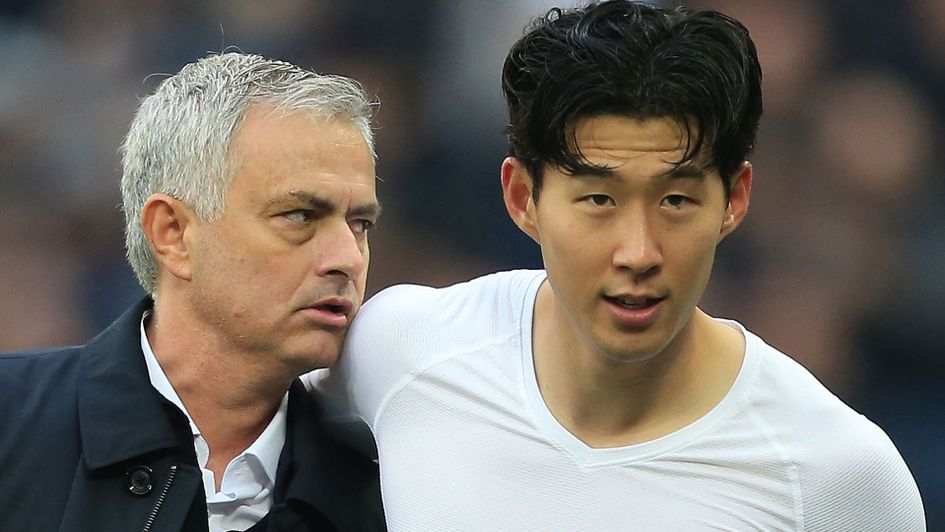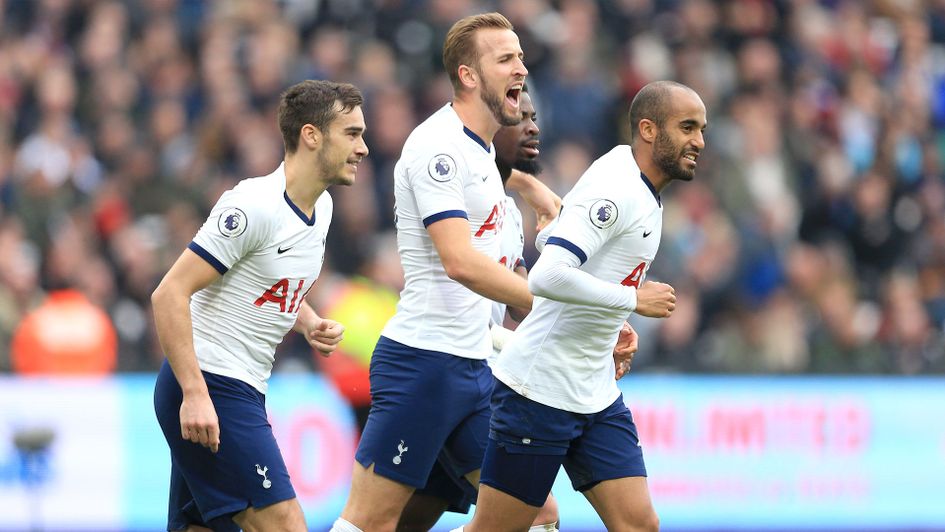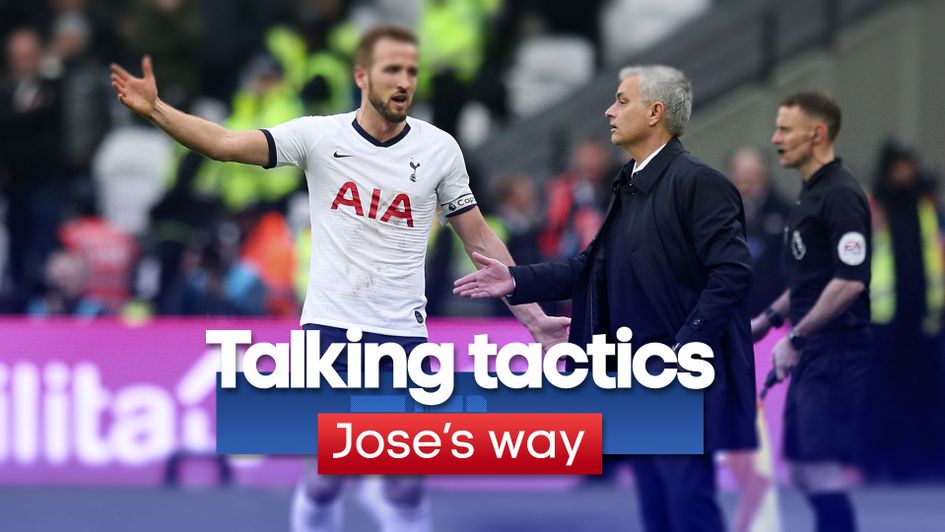Alex Keble talks tactics in a detailed analysis of Jose Mourinho’s first game in charge of Tottenham, as his new side beat West Ham 3-2 at the London Stadium.
Jose Mourinho has had an instant impact on Tottenham Hotspur both psychologically and tactically. He appears to have already changed quite a lot, and although most of his calls paid off, West Ham’s late comeback, inspired by Michail Antonio, highlighted the difficulty of the task at hand. Spurs remain brittle, lacking confidence or defensive resilience late on in matches.
But it would have been naïve to assume Tottenham would keep their calm for the whole 90 minutes; a volatile performance makes perfect sense following ‘a tough week emotionally’, in the words of Dele Alli speaking to BT Sport after the game.
Early signs are very positive, however. Mourinho seems to have stamped his authority on this team in a remarkably short period of time, even if West Ham were passive opponents for much of the contest. To be ‘happy for one hour’, as Mourinho said he was before ‘fatigue’ and ‘old emotions’ set in, is pretty good going.
Early signs of classic Mourinho football
Tottenham were notably more defensively cautious than under Mauricio Pochettino. In a 4-2-3-1 Mourinho deployed two defensive midfielders who, side by side, rarely ventured forward in attack; the positional conservatism of Harry Winks and Eric Dier marks a major departure from the fluidity of the old approach.
In Pochettino’s system the full-backs were expected to constantly overlap, whereas at the London Stadium Serge Aurier and Ben Davies very rarely moved forward, and if one went up the other held to form a back three. There was one telling moment in the first half when West Ham tried to break from a Spurs attack, only to find five bodies defending: a back three plus Winks and Dier. Unsurprisingly, such a strong defensive shield shut the counter-attack down.
Mourinho likes to clearly separate attacking and defensive duties, simplifying roles with clear demarcation, and the Spurs players evidently listened. Harry Kane, Heung-Min Son, Lucas Moura, and Dele Alli roamed freely in attack, while the other six outfield players rarely entered the final third.

This is classic Mourinho – and it isn’t necessarily negative.
The front four looked sharp and creative, using the safety of the defensive blockade behind them to take attacking risks – mimicking what we so often saw with Mourinho’s entertaining Chelsea in 2014/15, and with his Real Madrid side that scored 100+ league goals in three consecutive years.
Dele was clearly the standout performer in that first 60 minutes, moving brilliantly into gaps between the opposition lines and making runs ahead of Kane when appropriate. He excelled in the ‘second striker’ role that used to define him as a Spurs player, and it was a joy to watch. Crucially, the Tottenham players were keen to find him quickly – again reflecting Mourinho’s specific instructions.
The Portuguese preaches assertive, vertical passes into the attackers, such as the two sharp balls from Ben Davies into Dele, who promptly slipped Kane through for two early chances.

For Tottenham’s opener, Dele’s sudden dart out from the front line into the number ten space was spotted by Winks – and from a position of no danger Son, via two passes, was in on goal to score. Direct football, for Mourinho, is about seizing opportunities with quick-tempo interchanges in the final third.
Other notable Mourinho-esque traits included long balls from goal kicks, attempts to slow the game right down at 3-0, targeting opposition weaknesses (they floated crosses towards the shaky West Ham goalkeeper), and a defensive formation change – to a 4-4-1-1 – when West Ham started to get back into the match.
Things Mourinho needs to improve
It might simply be a confidence issue, but there were shaky moments in the Tottenham defence that Mourinho will want to work on. Toby Alderweireld was too easily caught flat-footed by Antonio when he scored West Ham’s first, and then Davinson Sanchez was turned by the same player, leading directly to the second.
Add to that some sloppy marking for Declan Rice’s disallowed strike and Tottenham could clearly do with some of the ruthless defensive coaching that made Mourinho famous.

Dier is likely to be a central figure under the new manager, but there was some evidence at West Ham of his clumsiness in possession. He gave the ball away on several occasions, betraying a lack of sharpness and intelligence that won’t endear him to Mourinho; he wants risk-aversion on the ball with simple, safe distribution from his anchor man.
Jose is all about efficiency, so Lucas’s profligate finishing won’t have gone down well. Mourinho could be seen wincing whenever Spurs missed an easy chance; in time, Lucas may find his erratic nature works against him.
Has Mourinho really changed?
Before the game Mourinho promised he would not change Tottenham’s style, but they are already notably different. Only time will tell if the bad temper has gone, or if he will indeed uphold the style - and mood - created by Pochettino.
Winks’s unexpected appearance in midfield suggests he may be happier to play young players than expected, although Ryan Sessegnon’s absence from the squad says otherwise. But aside from that, the notion that he needs to change tactically for Spurs’ fans to get onside is based on a misconception of his approach.
Tottenham created plenty of chances at the London Stadium, and although this might not chime with the popular idea of Mourinho it is, in fact, how he always wants to play against non-elite clubs. He doesn’t necessarily need to change.
What Spurs can expect long-term
In short, Spurs fans can expect more of the same – albeit for a full 90 minutes. The demarcation of defensive and attacking roles, the deep five-man block even when in possession, the free-moving front four, and the reactive management with focus on the opponent; these are the traits that define Mourinho.

He will need a new right-back and right-winger at the very least, with a powerful central midfielder also likely to arrive in the summer. Things will look more negative when they play fellow ‘big six’ clubs, but for the majority of matches it will be organisation and discipline that aims to give Dele, Son and Kane creative freedom.
Lose the late defensive collapse, and that would have been the archetypal Mourinho performance. It told us everything we need to know about the two years ahead.









